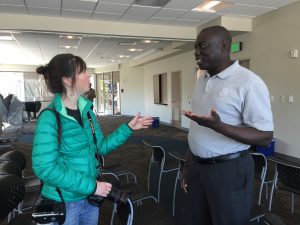
Salt Lake’s English Skills Learning Center is pursuing and expanding its goal to connect the community through language learning as refugees and immigrants continue to populate the state.
The English Skills Learning Center seeks to aid refugees and immigrants in gaining citizenship by equipping them with the skills necessary to be successful and confident members of society.
“Each year we bring together nearly 1,000 adult English language learners from more than 45 different countries with over 100 volunteer ESL teachers,” the English Skills Learning Center website says. “Classes are held in libraries, schools, community centers, apartment buildings and workplaces. Our goal is to bring the promise of integration, security and empowerment to adult English language learners in Salt Lake County by connecting them with members of their new community.”
All hopeful students are administered a language test designed to assess their English language skills and are then assigned to either beginning, intermediate or advanced classes. The classes include everything from citizenship and driving preparation to life skills and financial literacy.
Robert Simbe, the citizenship program coordinator, said they have one paid instructor, but they rely on volunteers.
“Volunteers are actually assigned classes so they can have their own class if they want to. They can also work one-on-one with students if they prefer.” Simbe said. Some of the staff are BYU graduates.
Simbe, an immigrant himself, now works at the English Skills Learning Center aiding those seeking citizenship through the process.
The Learning Center works with the Catholic Community Services and Holy Cross Ministries. These organizations provide attorneys who work with students to prepare for their citizenship interviews and assist them in preparing the required documents. Depending on the case, some attorneys will even accompany the student to their interviews.
“When a student passes the test, that’s the end of the process,” Simbe said. The center allows students to continue even after they have passed the test.
Students come from 45 different countries and speak 50 different languages. Refugees make up about 43 percent of the students, of which 70 percent are women. Sixty percent have had less than a high school education in their native country.
“I want to become a citizen so I can stop worrying,” said one man at a citizenship meeting, who has asked to remain anonymous. “I want to be able to vote and live my life free of worry.”
As more people seek this same end, the English Skills Learning Center endeavors to provide them with the resources to accomplish their goal.
To learn more information or volunteer can visit www.eslcenter.org.




